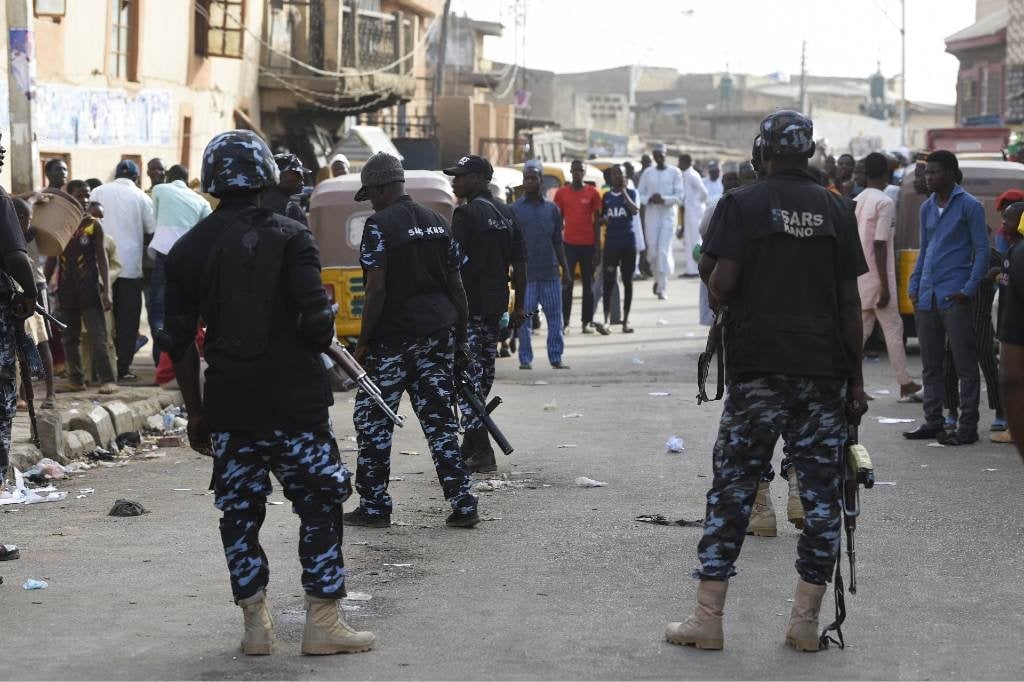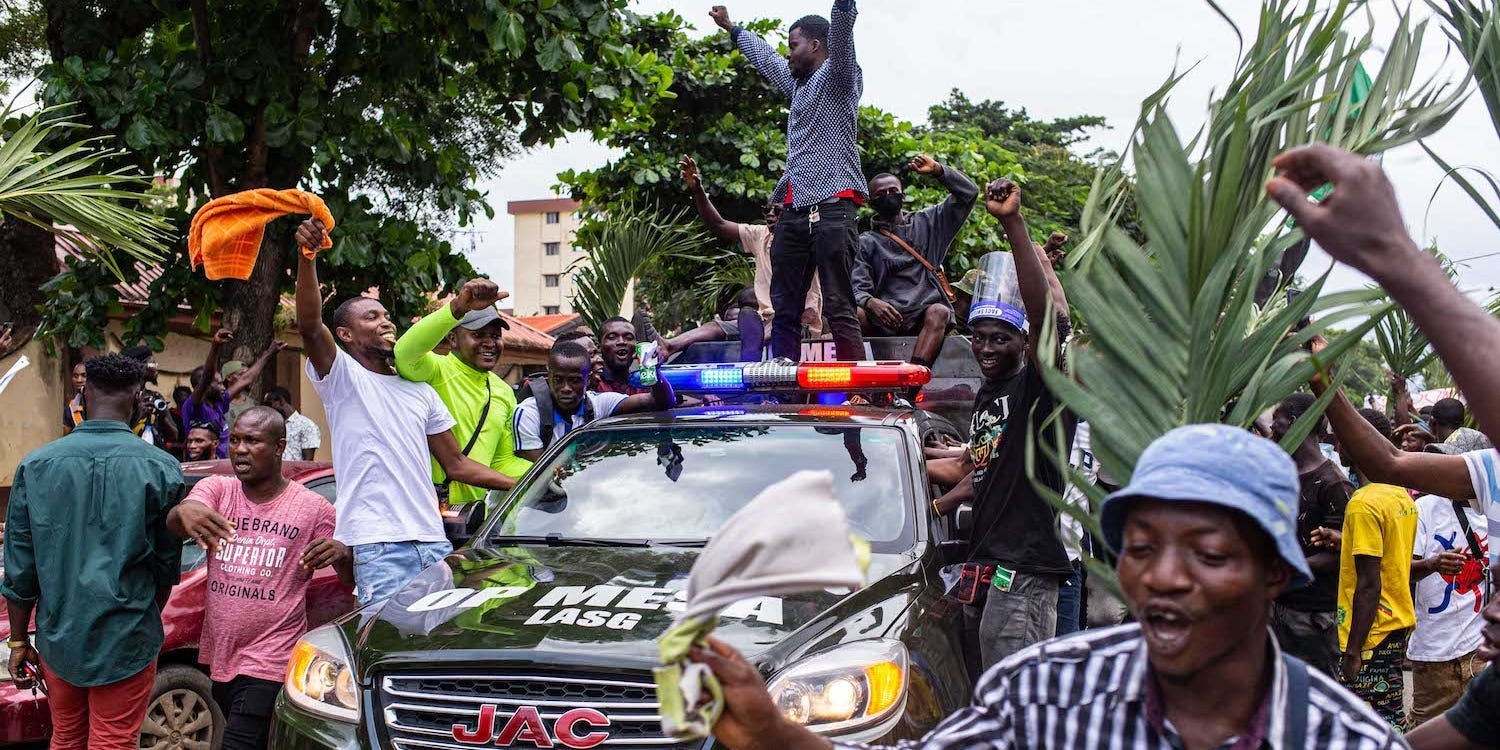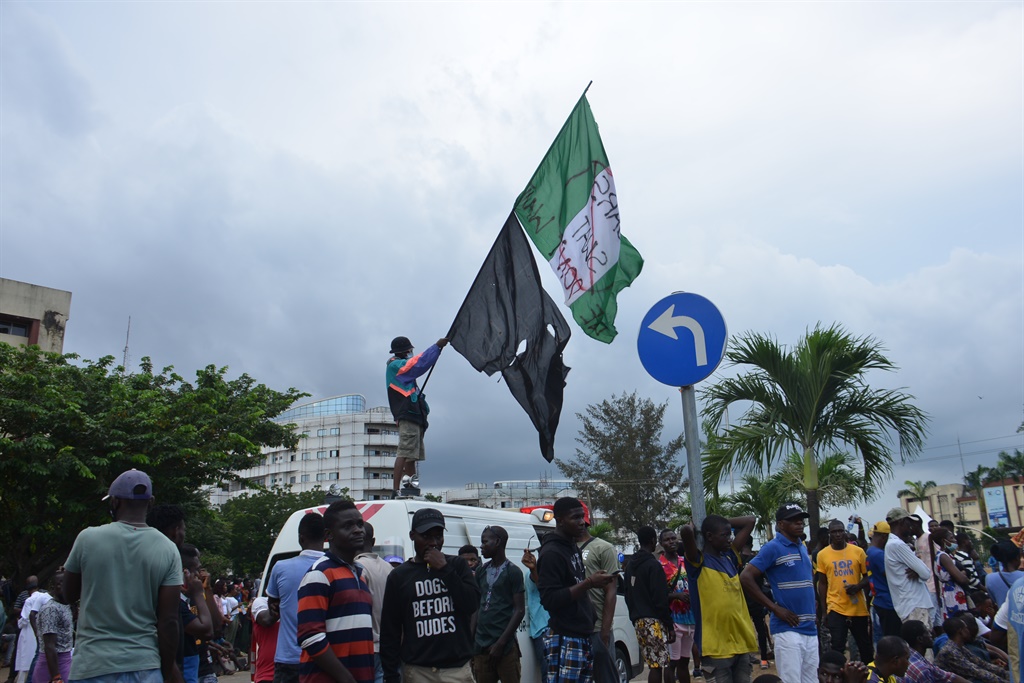- This is the fourth time in as many years that the government has promised to disband or reform the unit that citizens say has terrorised them for decades.
- Young protesters say they have heard it all before. This is not the first time the government had disbanded SARS and promised reforms.
- According to Amnesty International, the Nigeria Police Force (NPF) is responsible for hundreds of extrajudicial executions, other unlawful killings and enforced disappearances each year.
In April last year, Kofi Bartels, a 34-year-old radio journalist in Nigeria’s Rivers State, was filming three police officers from the Special Anti-Robbery Squad (SARS) beating another man when they and three of their colleagues turned their attention to him.
In a series of tweets, he described being beaten and arrested:
Philomena Celestine, 25, has also seen SARS brutality up close. In 2018, she was travelling home from her university graduation ceremony with her family in Edo State, when their car was pulled over by SARS officers and her two brothers taken out.
“My four-year-old niece was in the vehicle but they cocked their guns at our car and drove my brothers into the bush where they harassed them for over 30 minutes, and accused them of being cybercriminals. They could see my graduation gown but that did not deter them. My sister was trembling and crying in fear,” Celestine recalled.
These accounts are just two of many that sparked protests against the unit across Nigeria. It has been accused of harassing and physically abusing thousands of civilians since it was created in 1992. The #EndSARS protests resulted in the Nigerian government announcing earlier this month that it would disband the unit.
But this is the fourth time in as many years that the government has promised to disband or reform the unit that citizens say has terrorised them for decades.
And the problem of police brutality goes beyond SARS, the protesters say. According to Amnesty International, the Nigeria Police Force (NPF) is responsible for hundreds of extrajudicial executions, other unlawful killings and enforced disappearances each year.
Beginnings
The Nigeria Police was first established in 1820 but it was over a century later – in 1930 – that the northern and southern police forces merged into the first national police force; called the Nigeria Police Force.
In 1992, the Special Anti-Robbery Squad (SARS) was formed to combat armed robbery and other serious crimes.
Before that, anti-robbery was the responsibility of the Nigerian Police Force generally although, from 1984, anti-robbery units existed separately as part of different states’ criminal investigation departments.
Other special units, which went by different names at different times, included the intelligence response team, special tactical squad, counterterrorism unit and force intelligence unit, formed to tackle rising violent crime following the end of the Nigerian civil war in 1970.
By the early 1990s, armed robbers and bandits were terrorising Lagos and southern Nigeria.
Police officer Simeon Danladi Midenda was in charge of the anti-robbery unit of the criminal investigation department in Benin, southern Nigeria, at the time. He had some success in combatting armed robbery, earning a recommendation from the then inspector general of police.
With crime on the rise in Lagos, Midenda was transferred there and tasked with uniting the three existing anti-robbery squads operating in the former federal capital into one unit in a bid to break the stronghold of armed gangs. As the new sheriff in town, equipped with 15 officers and two station wagons, Midenda formed an amalgamated unit and named it the Special Anti-Robbery Squad (SARS) in 1992.
In the early days of the unit, combat-ready SARS officers operated undercover in plain clothes and plain vehicles without any security or government insignia and did not carry arms in public. Their main job was to monitor radio communications and facilitate successful arrests of criminals and armed robbers such as Chukwudi Onuamadike – best known as "Evans" – who was arrested in 2017 after the police spent five years tracking him and placed a $80 000 reward on his head.
Extorting money in broad daylight
For 10 years, SARS only operated in Lagos, but by 2002, it had spread to all 36 states of the federation as well as the Federal Capital Territory, Abuja. It was counted as one of the 14 units under the Nigerian Police Force Criminal Investigation and Intelligence Department. Its mandate included arrest, investigation and prosecution of suspected armed robbers, murderers, kidnappers, hired assassins and other suspected violent criminals.
Emboldened by its new powers, the unit moved on from its main function of carrying out covert operations and began to set up roadblocks, extorting money from citizens. Officers remained in plain clothes but started to carry arms in public.
Over time, the unit has been implicated in widespread human rights abuses, extrajudicial killings, torture, arbitrary arrests, unlawful detention and extortion.
SARS officers then allegedly moved on to targeting and detaining young men for cybercrime or being “online fraudsters”, simply on the evidence of their owning a laptop or smartphone, and then demanding excessive bail fees to let them go.
In 2016, Amnesty International documented its own visit to one of the SARS detention centres in Abuja, situated in a disused abattoir. There, it found 130 detainees living in overcrowded cells and being regularly subjected to methods of torture including hanging, starvations, beatings, shootings and mock executions.
Now, Nigerians say they have had enough. Since 2017, protests have been building momentum across Nigeria, stemming from online advocacy to street protests. The anger about the unit’s activities culminated in a nationwide protest on the streets of 21 states this month after a SARS officer allegedly shot a young man in Delta State.
Amid the ongoing protests, President Muhammadu Buhari announced that the unit would be disbanded. But this has not quelled the protests as young people continue to occupy the streets in large numbers demanding the immediate release of arrested protesters, justice for victims of police brutality, the prosecution of accused officers as well as a general salary increase for the police force to reduce corruption.Young protesters say they have heard it all before. This is not the first time the government had disbanded SARS and promised reforms.
In 2006 and 2008, presidential committees proposed recommendations for reforming the Nigeria Police.
In 2009, the Nigerian minister of justice and attorney general of the federation convened a National Committee on Torture to examine allegations of torture and unlawful killings but made little headway. In October 2010, the then Nigerian President, Goodluck Jonathan, allocated $196m for police reforms.
In 2016, the inspector general of the Nigeria Police Force announced broad reforms to correct SARS units’ use of excessive force and failure to follow due process.
A climate of fear
Historically, police officers who are alleged to have unlawfully killed Nigerians have faced few or no repercussions. For years, Amnesty International has reported cases of unlawful killings and police brutality by law enforcement agencies in Nigeria.
Reports of human rights violations committed by SARS have continued to mount, despite repeated promises of reform and accountability by the Nigerian government. The police authorities created a Complaint Response Unit (CRU) in November 2015, through which the police could process complaints from the public. To date, no SARS officer has been found responsible for torture, ill-treatment of detainees or unlawful killing.
The following year – 2016 – Amnesty International documented 82 cases of torture, ill-treatment and extrajudicial executions by SARS with victims usually young men between the ages of 18 and 35 arrested during street raids on groups of people doing things such as watching a football match or drinking at pubs. Research by CLEEN Foundation, a Nigerian non-profit organisation which promotes public safety and access to justice, found that the Nigeria Police Force lacked an effective database on complaints and discipline management.
In March 2017, SARS arrested 23-year-old Miracle Ifeanyichukwu Okpara and detained him in Anambra State, eastern Nigeria, on a charge of having stolen a laptop. Amnesty International reported that he was tortured and hardly given any food during 40 days of detention before he was taken to court and charged with armed robbery. The court discharged the case for lack of evidence.
Finally, in 2017, Nigerians launched a social media campaign with the hashtag #EndSARS to document abuse and extortion by SARS officers and demanded the total overhaul or disbandment of the unit.
Promises from government flowed in again. In December 2017, the inspector general of the Nigeria Police Force announced plans to reorganise SARS units. In August 2018, Nigeria’s vice-president and then acting president, Yemi Osinbajo, ordered the overhaul of SARS but allegations of abuse by SARS agents continued throughout the year.
Socrates Mbamalu, a 28-year-old writer and journalist living in Lagos, described how he has been living in a climate of fear following multiple encounters with SARS officers. Mbamalu told Al Jazeera that SARS officers targeted him in the street and searched his backpack while he was studying in Ife, Osun State. He does not know why he was targeted – only that he is a young man who was carrying a backpack.“They searched my backpack and saw my laptop which they accused me of stealing and demanded a receipt,” he explained. “They threatened to arrest and detain me, and searched my pockets, stealing my 1 000 naira ($3)."
He said:
Since protests began, young protesters have also been targeted by SARS. Judith Caleb, a 28-year-old blogger and one of the activists organising the protests in Kaduna, northern Nigeria, told Al Jazeera that the protest aimed to join in the fight to stop police brutality in the country and ensure accountability and justice for victims.
“In 2015, SARS killed one of our friends, Richard, a university student here in Kaduna. They accused him of buying a stolen phone, detained and tortured him until he died,” she said. “That is why we are out protesting. The police arrived here as early as 6am to stop the protest. They shot into the air to disperse us and arrested three people. But we were determined to continue with our peaceful protest. It is our right.”
'I was saying my last prayers'
While demonstrations across Nigeria have remained peaceful, security forces have responded with more brutality. The police have shot tear gas, water cannon and live rounds at protesters across the country. Armed men have also disrupted rallies and attacked protesters, forcing the organisers to hire private security to repel the attacks.
Jimoh Isiaq, a 20-year-old university student, was shot dead on October 11, 2020, during an #EndSARS protest in Oyo State, southwestern Nigeria. Isiaq was killed when a police team monitoring the protest allegedly opened fire at demonstrators with live bullets.
On October 12, police officers in Lagos allegedly opened fire to disperse protesters, killing 55-year-old Ikechukwu Ilohamauzo, and arresting dozens of protesters. On October 16, police teargassed and used water cannon on a group of protesters in Abuja. Police officers attacked journalist Gimba Kakanda, injuring him, smashing his phone and slashing the tyres of his car.
In a piece for Time about his experience, Kakanda wrote:
Osai Ojigho, director of Amnesty International Nigeria, has decried the use of excessive force against peaceful protesters and said that it makes claims of any commitment to ending violations of human rights by the Nigerian police redundant.
The #EndSARS movement is the biggest social protest the country has seen since the Occupy Nigeria movement of January 2012. It has attracted attention all over the world, with celebrities such as musician Kanye West, footballer Odion Ighalo, actor John Boyega and Twitter CEO Jack Dorsey among a list of people to have voiced support for the protests.Young citizens mostly in their 20s on the streets say they are tired of the promises of reforms and are expressing their anger at continuously being dehumanised and treated unjustly.
Maryam Ahmed, a 22-year-old protester, said:
For the #EndSARS protesters, restructuring the unit, changing its name and redeploying its officers to other units is not enough; reform must translate into accountability and justice.
"We are determined to continue these protests until justice is served," Judith Caleb said as she arranged her placards, ready for another day of protest, hoping to fix a broken system, and along with her fellow citizens, begin to heal from the trauma.




 Publications
Publications
 Partners
Partners
























